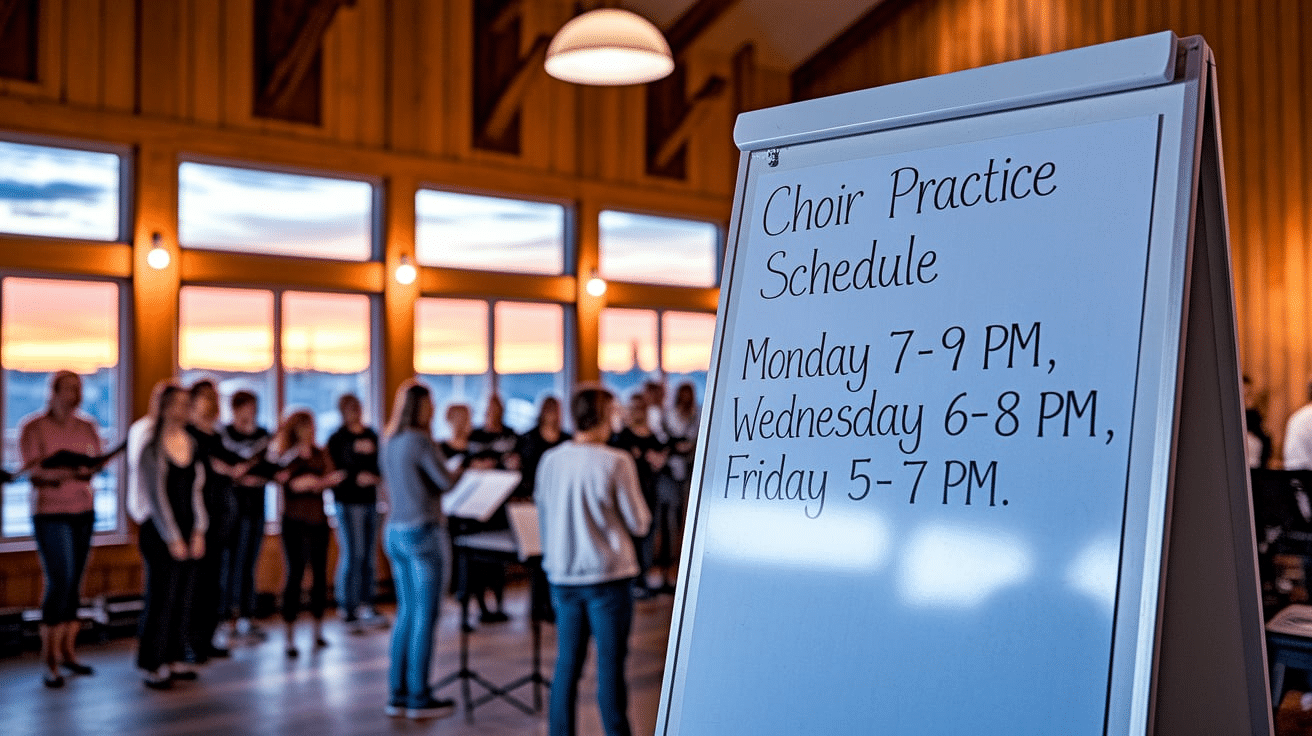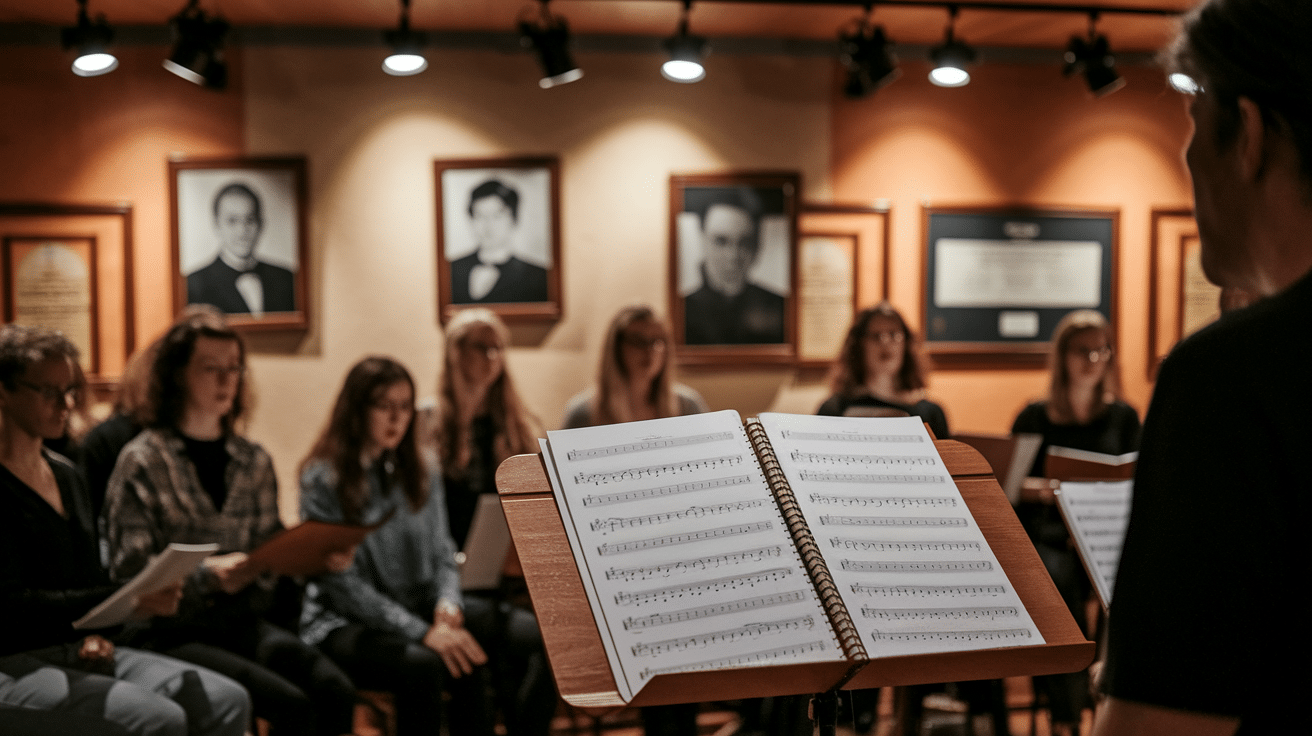Does your voice get tired halfway through choir practice? Or maybe you struggle to hit those tricky notes while everyone else seems to nail them?
Choir singing should be fun, not frustrating. The difference between feeling stuck and singing confidently often comes down to a few simple practice habits.
When you learn to train your voice the right way, singing becomes easier. Your range grows, your tone improves, and suddenly, those difficult parts don’t seem so hard anymore.
Good choir singers aren’t born with perfect voices—they just know how to practice smarter. Small changes in your routine can make a big difference in how you sound.
This guide shares practical tips to help you get more from every choir session. We’ll cover exactly what to focus on before, during, and after practice so you can sing better without straining.
Let’s help your voice reach its true potential!
What is Choir Practice?
Choir practice is when singers meet to learn songs together. It’s the training ground where voices become a team. During practice, singers work on getting the right notes and words. They learn to breathe properly and form clear sounds with their mouths.
The choir director leads these sessions. They help each singer understand their part in the bigger picture.
Harmony is key in choir singing. Some voices carry the main tune while others add notes that make the sound fuller when combined.
A typical practice starts with warm-ups. Then, singers might split into groups based on voice type—sopranos, altos, tenors, and basses. Each group works on its specific part.
By the end, everyone comes together to blend all parts. The goal is to create music that sounds balanced and unified.
How to Prepare for Choir Practice?

Ever showed up to choir and your voice cracked on the first note? Proper prep prevents poor performance! Here’s how smart singers get ready before they even step through the door:
- Jump-start your voice with a 5-minute warm-up at home – hum in the shower or do gentle scales while driving
- Become a water-drinking champion – your vocal cords crave moisture hours before you sing
- Set up a “choir survival kit” with your music folder, pencil, water bottle, and throat drops
- Scan your music the night before – mentally rehearse those tricky spots that tripped you up last time
- Ditch the tight clothing – your lungs need room to fill completely
- Skip the dairy products before practice – they create mucus that clogs your sound
- Practice “singer’s posture” while waiting in line at the store – straight spine, relaxed shoulders
- Create a pre-practice ritual that signals to your brain, “it’s singing time!”
- Show up early enough to chat with fellow singers – a relaxed mind produces a better sound
- Keep your phone buried deep in your bag – nothing kills your focus faster than notifications
What are the 4 Levels of Choir?
Choir groups come in many shapes and sizes, but they typically fall into four main levels based on skill and commitment.
Think of these levels as stepping stones in your singing path. Just like in sports or other skills, singers usually start at one level and work their way up as they gain experience and training.
The jump between levels isn’t just about how well you sing—it’s also about your music reading skills, how well you blend with others, and how quickly you can learn new pieces. Each level brings new challenges but also more rewarding musical experiences.
Here’s a quick look at what sets each choir level apart:
| Level | Key Skills | Weekly Practice | Music Type |
|---|---|---|---|
| Beginner | Basic pitch matching | 1-2 hours | Simple harmonies |
| Intermediate | Steady pitch, breath control | 2-3 hours | Three-part songs |
| Advanced | Strong vocal range and good blend | 3-5 hours | Complex pieces |
| Professional | Perfect pitch, style mastery | 10+ hours | Multi-layered works |
Most community and school choirs are beginner to intermediate level, while college and regional choirs often reach an advanced level.
Professional choirs include paid positions where singers earn part or all of their living through performances.
Creating a Consistent Choir Practice Schedule

Regular practice is what separates good singers from great ones. Just like athletes need to train between games, choir members need to work on their skills between group practices.
When you practice regularly, your voice builds muscle memory. This means those tricky parts become easier over time, and your overall singing improves faster. Here’s how to build a practice routine that works:
- Pick fixed times for practice and mark them on your calendar like any other important meeting
- Start small with just 10-15 minutes daily rather than an hour once a week
- Create a practice space at home where you won’t feel shy about making noise
- Use a timer to stay focused during practice sessions
- Break down difficult passages into tiny chunks you can master one at a time
- Record yourself singing and listen back to hear what needs work
- Track your progress in a simple notebook to stay motivated
- Find an accountability buddy from your choir to check in with weekly
Sample Schedule for Beginners (15-20 minutes per day)
| Day | Time | Focus Area | Duration |
|---|---|---|---|
| Monday | Before breakfast | Breathing exercises | 8 min |
| Monday | After dinner | Simple scales | 7 min |
| Tuesday | Lunch break | Practice one page of music | 15 min |
| Wednesday | Before shower | Vocal warm-ups | 10 min |
| Wednesday | Before bed | Humming practice | 5 min |
| Thursday | Morning coffee | Listen & hum along to recordings | 15 min |
| Friday | Commute time | Mental practice of lyrics | 10 min |
| Weekend | After breakfast | Full piece practice | 20 min |
Sample Schedule for Deep Practice (3-4 times per week)
| Day | Warm-up | Main Practice | Cool Down | Total Time |
|---|---|---|---|---|
| Monday | Breathing (5 min) | Work on harmony parts (25 min) | Gentle humming (5 min) | 35 min |
| Wednesday | Scales (10 min) | Difficult sections (20 min) | Review recording (10 min) | 40 min |
| Friday | Lip trills (5 min) | Blend & dynamics (25 min) | Relaxation (5 min) | 35 min |
| Sunday | Full warm-up (15 min) | Complete run-through (30 min) | Self-evaluation (15 min) | 60 min |
Remember that consistency beats perfection. Five short practices a week will help you more than one long session, even if each practice isn’t perfect.
Rehearsal Techniques for Effective Practice

Great choir rehearsals don’t happen by accident. They use specific techniques to help singers improve quickly and enjoy the process.
These methods work for groups and for your practice, too.
1. Chunk method: Instead of repeatedly running through a whole song, break it into small sections of 2-4 measures. Work on one chunk until it sounds good, then move to the next. This focuses your attention and fixes problems faster.
2. Slow practice: When you hit a tough part, cut the tempo in half. At slower speeds, your brain can process the notes and rhythms more clearly. Once you master it, gradually speed up to a normal tempo.
3. Shadow singing: Sing very softly or mouth the words while others sing at full volume. This helps you learn your part without getting confused by other voices.
4. Record and review method: Record your practice and listen back with your music in hand to catch issues you might miss while singing. You’ll spot timing issues, pitch problems, and unclear words that need work.
5. Staggered breathing: Mark breathing spots in your music, but don’t all breathe in the same places. This creates seamless sound without gaps for better coordination between voice parts.
These techniques make rehearsals more productive and help you grow as a singer, both in group settings and when practicing alone.
Benefits of Choir Practice

Choir practice offers far more than just better singing skills. The regular act of singing together improves both body and mind in surprising ways.
Physical Benefits:
- Improved breathing through proper technique strengthens your lungs and diaphragm.
- Better posture becomes natural as you practice standing tall while singing.
- Your voice gets stronger with regular use, and facial muscles tone from articulation exercises.
Many singers report better sleep after evening choir practice due to the combination of physical activity and stress reduction.
Emotional and Social Benefits:
- Stress melts away during choir as singing releases feel-good chemicals in your brain.
- The sense of belonging creates strong social bonds that often extend beyond practice.
- Confidence grows when you master challenging music and perform it well.
- Working as a team to create beautiful harmony teaches patience and cooperation.
Many choir members describe the emotional uplift as their “weekly therapy” that helps them better handle life’s challenges.
From Practice to Performance
Choir practice is more than just singing notes on a page. It’s a path of growth, connection, and joy that builds both musical skills and personal strength.
Each time you attend practice, you add another layer to your musical foundation. Your breathing deepens, your ear sharpens, and your confidence grows.
The most beautiful choir performances come from singers who practiced with purpose. They didn’t just go through motions—they paid attention, made adjustments, and supported each other along the way.
Why not try one new practice technique this week? Notice how it changes your experience. Then, next week, add another. These small steps create noticeable improvements that both you and your fellow singers will hear.
Your voice completes the choir’s sound. Make it count!
















